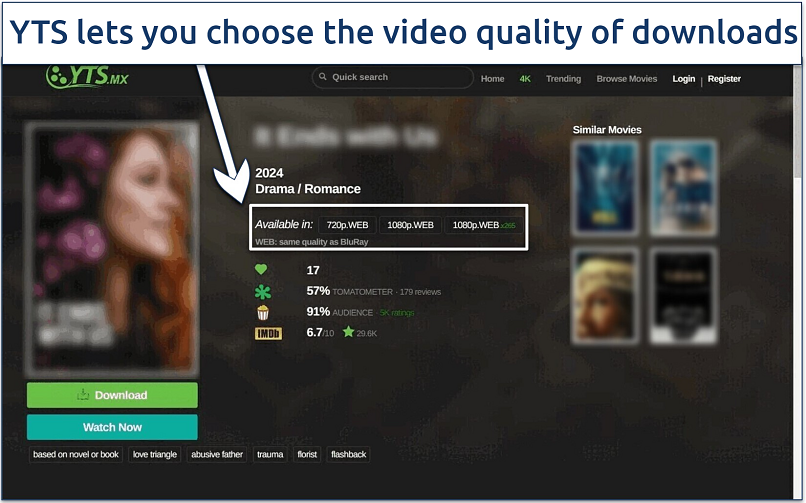Introduction
Kickass Torrents (often abbreviated as KAT) was once one of the most popular and widely used torrent websites in the world. Established in 2008, it quickly rose to prominence for providing access to a vast collection of torrents, including movies, TV shows, music, software, and games. At its peak, KAT was the go-to platform for millions of users looking to download and share files through the BitTorrent protocol. However, its success also attracted the attention of authorities, leading to legal battles and eventual shutdowns. In this article, we’ll explore the rise and fall of Kickass Torrents, its impact on the digital landscape, and its legacy in the torrenting community.
The Rise of Kickass Torrents
Kickass Torrents was launched in 2008 by a group of anonymous founders. Unlike many of its competitors, KAT boasted a sleek and user-friendly interface, which made it more accessible to a broader audience. Its sophisticated design, along with a robust search engine, enabled users to quickly find and download torrents across a wide range of categories.
The platform gained popularity rapidly due to its reliable and regularly updated torrent library. Whether users were looking for the latest blockbuster movies, popular TV series, or software applications, KAT provided a reliable hub for accessing these files. By 2014, it had overtaken The Pirate Bay as the most-visited torrent website, making it the dominant player in the torrenting ecosystem.
How Kickass Torrents Worked
Like most torrent websites, Kickass Torrents didn’t actually host the files themselves but rather provided a directory of torrent files and magnet links that allowed users to download files via the BitTorrent protocol. Here’s how it worked:
- Torrent Files: These are small files containing metadata about the files users want to download, such as the file size, the location of pieces of the file on the network, and information about the seeders and leechers.
- Magnet Links: These are more advanced than traditional torrent files, offering a way to directly connect a torrent client (such as uTorrent or qBittorrent) to the users who are sharing the file. Magnet links made sharing easier and improved privacy, as they did not require a central server to host the torrent file itself.
- Seeders and Leechers: As with other torrent websites, KAT relied on seeders (users who have fully downloaded a file and are sharing it) and leechers (users who are in the process of downloading the file). A higher number of seeders generally led to faster download speeds.
- User Community: KAT had an active community of users who uploaded, shared, and commented on torrents. Users often rated the torrents, which helped others avoid downloading malicious or fake files. This community aspect was a key feature that helped build trust among users.
Legal Issues and the Shutdown
Due to its popularity and the vast amount of copyrighted material shared on its platform, Kickass Torrents became a prime target for copyright holders and law enforcement agencies. While the site itself did not host any illegal content, its role in facilitating the distribution of copyrighted material made it vulnerable to legal action.
In July 2016, after years of legal pressure, the U.S. government seized KAT’s domain and arrested its alleged founder, Artem Vaulin, in Poland. The U.S. Department of Justice charged Vaulin with multiple counts of criminal copyright infringement and conspiracy to commit money laundering, claiming that KAT had caused billions of dollars in losses to copyright holders.
This marked the end of the original Kickass Torrents website, which was taken offline along with its mirror sites and domains. The arrest and seizure were significant blows to the torrenting community, as KAT had been the most popular torrent site at the time.
The Aftermath and KAT’s Legacy
After Kickass Torrents was taken down, many clone and mirror sites appeared, attempting to fill the void left by the original platform. However, these copies were often unreliable and filled with malicious ads, fake torrents, or outright scams. While some clones briefly gained traction, none were able to fully replicate the success or trustworthiness of the original KAT.
Shortly after the shutdown, several members of KAT’s original staff launched a new torrent site called Katcr.co, which was intended to be a spiritual successor to Kickass Torrents. Although this new site attracted some attention, it never quite reached the same level of popularity or reliability as its predecessor.
KAT’s demise left a significant gap in the torrenting world, and users were forced to migrate to other platforms such as The Pirate Bay, 1337x, RARBG, and YTS. Despite its absence, KAT’s influence on the torrenting community remains strong, with many users fondly recalling it as one of the best-designed and most user-friendly torrent sites of its time.
Ethical and Legal Debate: Piracy vs. Free Access
The shutdown of Kickass Torrents reignited the debate over file sharing and piracy. Supporters of torrent websites argue that platforms like KAT provide free access to content that would otherwise be restricted by high costs, licensing issues, or geographical barriers. For many people, especially in countries where access to digital content is limited or expensive, torrenting offers a way to enjoy movies, music, and software that they might not otherwise afford.
On the other hand, critics and copyright holders argue that torrenting sites like KAT contribute to massive losses in revenue for content creators, studios, and software companies. Piracy is often blamed for declining sales in industries such as music, film, and gaming, as users can obtain digital content without paying for it. This, in turn, affects the livelihoods of artists, developers, and producers.
While the ethical debate over torrenting continues, legal authorities worldwide have increased their efforts to crack down on torrent sites. Many countries have introduced stricter anti-piracy laws, and internet service providers (ISPs) are often required to block access to popular torrent websites.
Alternatives to Kickass Torrents
After the fall of KAT, users began looking for alternative torrent sites to continue downloading and sharing files. Some of the most popular alternatives to Kickass Torrents include:
- The Pirate Bay: The longest-running and most resilient torrent site, The Pirate Bay continues to be a favorite among torrent users. Despite numerous legal battles and shutdowns, it remains operational with a wide range of content.
- 1337x: This site gained popularity after the fall of KAT and is known for its well-organized torrent library and active user community. It provides torrents for movies, TV shows, software, music, and more.
- RARBG: RARBG is favored for its high-quality torrents, especially for movies and TV shows. It also provides an easy-to-use interface and a wide variety of content.
- YTS: Focused on movies, YTS is known for offering high-quality video files with relatively small file sizes, making it a popular choice for movie enthusiasts with limited bandwidth.
- LimeTorrents: Another popular alternative, LimeTorrents offers a broad selection of torrents across various categories. It’s often seen as a reliable backup when other major sites are down.
Conclusion
Kickass Torrents was a dominant force in the world of torrenting, offering millions of users access to a vast library of content. Its user-friendly interface, active community, and vast selection of torrents made it one of the most popular torrent platforms in history. However, its success also led to its downfall, as legal authorities cracked down on piracy and copyright infringement.
Despite its shutdown, Kickass Torrents left a lasting legacy in the torrenting community, and its influence is still felt today through the many alternative torrent sites that have emerged. For better or worse, KAT remains a symbol of the ongoing battle between free access to content and the enforcement of copyright laws in the digital age.

 ENTERTAINMENT8 months ago
ENTERTAINMENT8 months ago
 BLOG11 months ago
BLOG11 months ago
 NEWS11 months ago
NEWS11 months ago
 BLOG11 months ago
BLOG11 months ago
 NEWS11 months ago
NEWS11 months ago
 GAMES11 months ago
GAMES11 months ago
 Education11 months ago
Education11 months ago
 TECH10 months ago
TECH10 months ago



